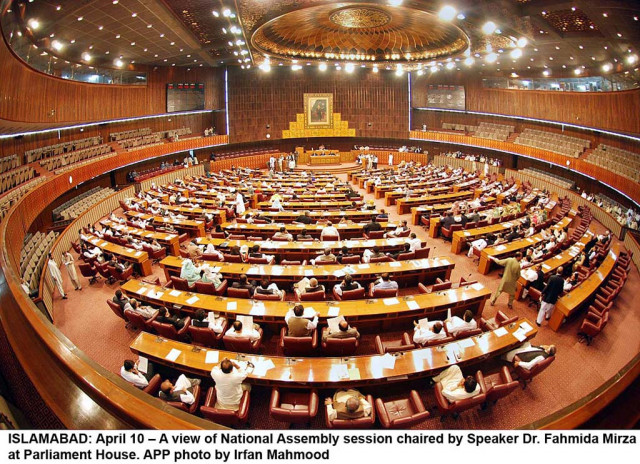Curtain falls on PML-N govt as poll games begin
Election activity kicks off today as ECP announces schedule for July 25 elections

PHOTO: FILE
The previous government, led by the Pakistan Peoples Party, holds the distinction of being the first in the country’s history to complete its full five-year constitutional term.
The National Assembly stood dissolved at midnight on May 31 after the Ministry of Parliamentary Affairs issued a notification in this regard.
The notification, issued under Article 52 of the Constitution, reads: "The National Assembly shall, unless sooner dissolved, continue for a term of five years from the day of its first meeting and shall stand dissolved at the expiration of its term."
A caretaker set-up led by former chief justice of Pakistan Nasirul Mulk would be sworn in today to take charge at the Centre till the general elections scheduled for July 25.
Pakistan heading towards sustainable democracy
At the provincial level, the Punjab and Balochistan assemblies also wound up at midnight on May 31, while the Sindh and Khyber-Pakhtunkhwa assemblies completed their terms on Monday.
For a country known for political upheaval and long bouts of military rule, this is no mean achievement.
Outgoing prime minister Shahid Khaqan Abbasi defended his government in his final address to the National Assembly, saying his government had launched economic reforms, raised salaries for the bureaucracy, and launched several development projects.
The government managed to stay in power despite frequent showdowns with the army and an increasing judicial activism on the part of the Supreme Court, which pursued several cases against the government and the bureaucracy.
Democracy and higher education
A contingent of armed forces personnel presented a guard of honour to the prime minister as he departed from the Prime Minister Office.
Earlier, The Election Commission of Pakistan (ECP) announced on Thursday the schedule for July 25 general elections.
Prospective candidates for national and provincial assembly seats have been asked to submit their nominations between June 2 and June 6.
Returning officers will publish the names of nominated candidates on June 7 and start scrutiny of their credentials the same day. The scrutiny process would conclude on June 14.
Any objections against acceptance or rejection of nomination papers by returning officers can be filed before June 19.
Appellate tribunals would conduct hearings into such petitions till June 26. Once this process concludes, a revised list of candidates would be published by the returning officers the next day – June 27.
June 28 is the last date for withdrawal of candidates, after which the election authorities would publish a final list of candidates. RO’s will allocate election symbols to the candidates on June 29.
Moreover, the farewell session of the 14th National Assembly prorogued here on Thursday. National Assembly Deputy Speaker Murtaza Javed Abbasi read the prorogation orders of President Mamnoon Hussain.
Flaws in our democracy
Prime Minister Shahid Khaqan Abbasi and opposition leader Syed Khursheed Shah were both in attendance.
In his address to the last session of the National Assembly, the prime minister lauded the role of all parliamentarians, party heads, the National Assembly speaker, and the federal ministers for playing their due role in strengthening parliament and democratic traditions in the country.
He was very appreciative of the role of National Assembly Speaker Ayaz Sadiq for raising the stature of parliament and strengthening democratic traditions.
Abbasi also spoke highly of Opposition Leader in the National Assembly Syed Khursheed Ahmed Shah and particularly mentioned his strong stance wherein he stood for democratic principles and supremacy of parliament.
He acknowledged that Khursheed Shah served as a potent leader of the opposition and was offered positive criticism of the government.
Later, Shah appreciated the role of parliamentarians in ensuring the supremacy of parliament and strengthening of democracy.
He said, "It is the prime responsibility of the all political parties to work for the strengthening of parliament and democracy."
Towards a plural and prosperous Pakistan?
He said it was encouraging to note that parliament is completing its constitutional tenure second time in country's history.
Shah also congratulated the speaker for conducting house business in a neutral manner. "I on behalf of the whole opposition, my party, and the nation congratulate you for your role in the running the business of the house in a smooth manner," he added.
Lawmakers in the last session also spoke about the five-year performance of the National Assembly and appreciated the performances of Speaker Sardar Ayaz Sadiq, Deputy Speaker Abbasi, Parliamentary Affairs Minister Sheikh Aftab Sheikh and Opposition Leader Shah.
A total of 56 sessions of the National Assembly had been held since June 1, 2013 to May 31, 2018. In addition to this, 12 joint sessions of parliament were also held during this time.
The house remained in session for the longest time during Pakistan Tehreek-e-Insaf and Pakistan Awami Tehreek's 126-days sit-in in the federal capital.
Various heads of the states including Turkey, Indonesia and China addressed the joint session of the parliament. President Mamnoon Hussain also addressed the joint session of the parliament five times.
The incumbent National Assembly has also the distinction of passing six federal budgets.
The House also passed a total of 187 bills during the last five years tenure, besides passing 136 Act of Parliament.
With additional input from APP


















COMMENTS
Comments are moderated and generally will be posted if they are on-topic and not abusive.
For more information, please see our Comments FAQ